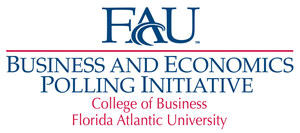News provided by
Florida Atlantic University Business and Economics Polling InitiativeFeb 07, 2018, 05:00 ET
BOCA RATON, Fla., Feb. 7, 2018 /PRNewswire-USNewswire/ -- A majority of Floridians support permanent legal status for children who were brought illegally to the United States, often described as Dreamers, but Florida voters are split on whether a wall should be built on the U.S. border with Mexico, according to a statewide survey by the Florida Atlantic University Business and Economics Polling Initiative (FAU BEPI).
While 58 percent of Florida voters support the Deferred Action for Childhood Arrivals (DACA) program, only 26 percent oppose. Voters by a margin of 47 to 32 percent also support extending the Temporary Protected Status for Haitians, Salvadorans, Nicaraguans and Hondurans who were granted temporary rights to live and work in the U.S. after a series of calamities occurred in their countries.
On the issue of building a border wall between the U.S. and Mexico, 43 percent support the wall, while 45 percent oppose. Voters are also split on compromising on building a wall in exchange for permanent legal status for Dreamers, with 37 percent supporting and 39 percent opposing.
On the political front, Florida Gov. Rick Scott's prospects for being elected to the U.S. Senate continue to improve. Although Scott has not officially declared his candidacy for the seat currently held by Sen. Bill Nelson, the latest poll shows Scott with a 10-point lead over the incumbent, a 12-point swing from an August 2017 poll that showed him trailing Nelson 42 to 40 percent.
No clear favorite has emerged in the Florida governor's race. Trial attorney John Morgan leads with just 13 percent of the vote, followed by Florida's Commissioner of Agriculture Adam Putnam at 10 percent, and former U.S. congresswoman Gwen Graham at 9 percent.
U.S. President Donald Trump's approval rating among Florida voters remained at 41 percent, the same level as the November 2017 poll, while his disapproval rating dipped slightly at 44 percent.
The survey, which polled 750 Florida registered voters Feb. 1-4, was conducted using an online sample supplied by Survey Sampling International using online questionnaires and via an automated telephone platform (IVR) using registered voter lists supplied by Aristotle, Inc. The survey has a margin of error of +/- 3.7 percentage points.
SOURCE Florida Atlantic University Business and Economics Polling Initiative
WANT YOUR COMPANY'S NEWS FEATURED ON PRNEWSWIRE.COM?
Newsrooms &
Influencers
Digital Media
Outlets
Journalists
Opted In



Share this article